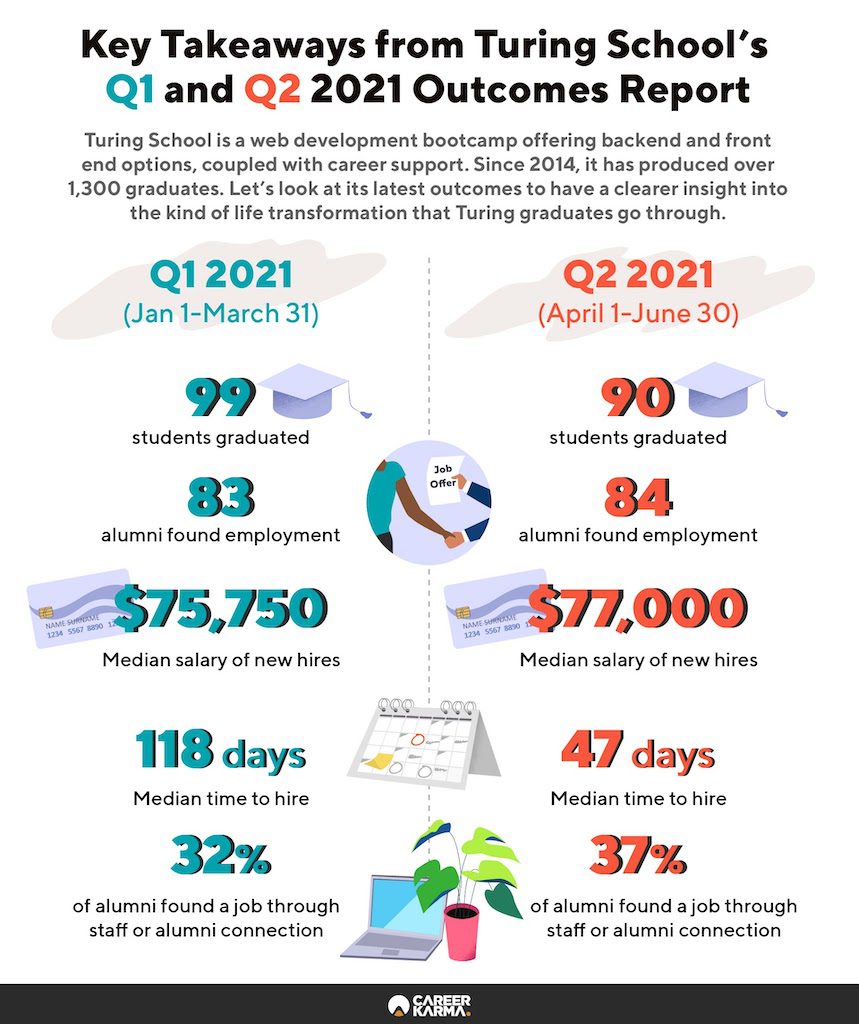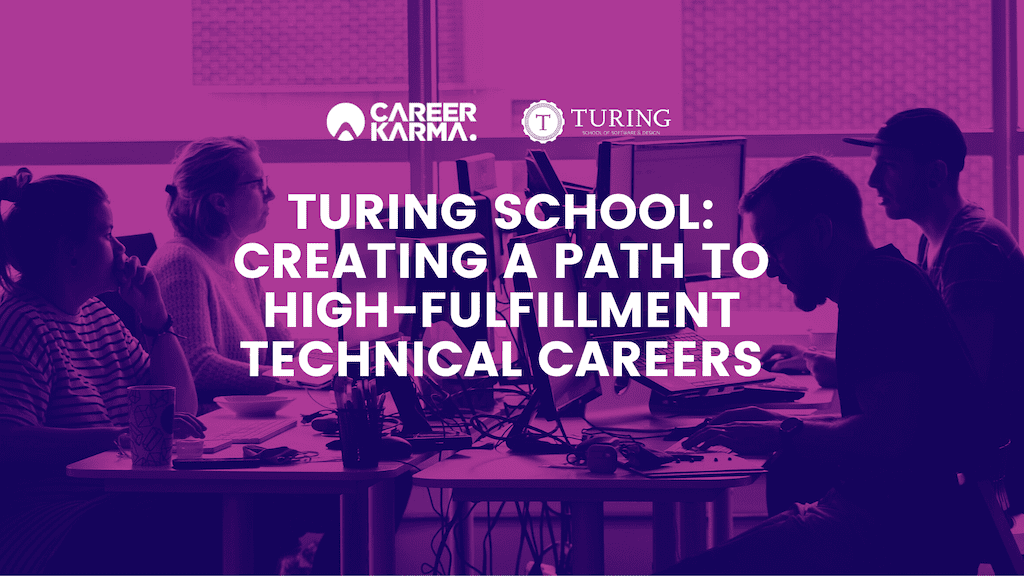According to Kyle Thayer’s 2020 dissertation, there are five recurring criteria that employers often want in their hires: relevant educational experience and credentials, software-industry work experience, online portfolios, networking with employers and engineers, and interviewing abilities. Those requirements sum up what coding bootcamps often aim to cover as they prepare students for a tech career.
At Turing School, students get extensive training on tools that make front-end and back-end engineering possible such as JavaScript, Ruby, React, and many more. These lessons often come with hands-on exercises and capstone projects, where learners engage in practical and real-world problems.
The school also provides career support, which includes job interview lessons, portfolio-building tips, and networking opportunities, especially through Terminal.
If we put all these together, how has Turing School prepared its graduates for the workplace?
Turing offers robust front-end and back-end development training along with top-tier career services, ensuring graduates are ready for the job market.
Register with Turing today.Turing School Job Outcomes Review: Success by the Numbers

Since 2014, Turing has had over 1,300 graduates. Statistics on its website say that over 95 percent of its alumni are working in the tech industry, with a median starting salary of $75,000 in their first technical job.
Narrowing down to 2021, Turing produced 189 graduates across three cohorts in the first half of the year. Also, 167 of its alumni accepted a job between January and June, according to its outcomes report for the first quarter and second quarter. That shows an improvement on the reports from the second half of 2020, where 129 students graduated while 98 alumni accepted jobs.
The latest data shows that 90 learners have graduated between April 1 and June 30 this year. In the same period, 84 alumni have accepted a job. Further, the report reveals that 37 percent of these jobs came from connections made by Turing staff or alumni while three percent found employment via their portfolio.
Altogether, the median time it took for Turing graduates to land a job was 47 days. And, they had a median starting salary of $77,000 for first-time hires.
Turing School Outcomes: Alumni Success Stories
By the year, coding bootcamps like Turing School are becoming integral pieces for crossing successfully into a tech career. They give second chances, helping folks to rediscover their passion and get high-paying roles. And in many cases, they train people—even those without a coding background—to become high-skilled tech professionals.
Katherine Lewis’s story is a typical example of Turing’s life-changing experience. Before Turing, she worked as a teacher under the Teach For America program. After several failed attempts to get a job in management consulting, she opted for a programming career with Turing.
“I didn’t see other programs with as much of an emphasis on the social aspect of programming. I didn’t want to just learn how to code, I wanted to be a responsible engineer,” said Katharine.
Life at Turing wasn’t exactly smooth for Katherine. At some points, she struggled with some personal issues, which affected her performance in school. She failed Module 3 and decided to repeat it. But fast forward to a couple of months, Katherine found a job at LinkedIn as an intern software engineer.
“Before Turing, I was on a $35,000 teacher salary trying to pay off existing student loans. I started at ground zero, took out a loan to attend, and made sure to be strategic in my job hunt so I could start paying off my loans quickly. With my starting salary at LinkedIn, my income more than doubled. The company aligned with my values and the company culture was exactly what I was looking for.”
Julian Feliciano had a similar experience. Growing up, his neighborhood did not have access to good jobs, education, and opportunities. “It is still a struggle for many where I grew up,” he said. However, after seven months at Turing, Julian became a back-end developer. Two months later, he got a job at Stitch Fix.
Today, he is giving back to his society by encouraging underrepresented groups to join the tech industry. He is also inspiring kids who are facing similar challenges as he did in his youth.
What Do Employers Say About Turing Graduates?
Turing School’s programs involve seven months of intensive training in either back-end or front-end engineering. Spending such extended time—along with the school’s hands-on approach in its training—helps students better approach real-world problems.
Quoting Jeff Casimir, Executive Direction and Founder of Turing, “A Turing grad doesn’t know the most about programming. Turing grads know how to make the best of when things go wrong.”
Ryan Roe’s testimony, Talent Acquisition Analyst at Shalom, confirms Jeff’s claim. “We have had over 35 Turing graduates join Shalom since 2019. The candidates that join our team not only have the hard technical skills that are essential in today’s marketplace, but also the critical thinking real-world skills that make them adaptable and versatile contributors to our numerous clients.”
According to Alex Robinson, Director of Back-End Engineering at Turing School, Turing graduates’ knack for problem-solving results from their methodological approach to challenges. And Demo Comp is another event that provokes creativity in its alumni and also teamwork.
The Director of Quality and Reliability at AppOmni, Seth Urban, also has positive things to say about Turing graduates.
“My team has hired two Turing graduates in the past six months. Overall, I would say that Turing graduates are more technically competent and versed in modern technology stacks than the average computer science college graduate.”
When asked whether he would recommend hiring from Turing School to other employers, Ryan Roe replied, “Yes. Hiring Turing grads has been a huge success for us at Shalom, and I would recommend any organization that is looking for technical talent to partner with Turing for hiring needs.”
How Turing School Supports Diversity
Turing School has a policy for equality and inclusion, giving equal treatment to people from all races, religions, or gender. As a result, it has a diverse community of students, alumni, and staff, forming several affinity groups collectively called Circles.
One of such groups is TAPIDA or the Turing Asian Pacific Islander Desi Americans. It is an affinity group for Asians who bond together on a dedicated Slack channel.
TAPIDA was a place to socialize in its early years but it evolved into a channel where alumni support current students. Sometimes, it’s a mock test or a workshop. Other times, it’s mentorship or coaching.
The QueerQoders is another example of Turing driving inclusion through socialization. The group is a virtual community of LGBTQIA2S+. Others include Shade of Turing for the BIPOC, Mezcla for the Hispanic, Latinx, and Chicanx.
Join the Turing Community Today
“Attending Turing was a positive experience for me and now I want to pay it forward. I was a career changer with no technical background, and now I mentor students who are in that same place I was. I miss the everyday community feel of going to Turing, but I love that I’ll always be a part of this community in some way,” Jamison Ordway said.
Are you looking for a place to launch your tech career? Like Katherine, Julian, and Jamison, you too can transform your life in less than a year. Register with Turing School today to start your journey.
About us: Career Karma is a platform designed to help job seekers find, research, and connect with job training programs to advance their careers. Learn about the CK publication.




